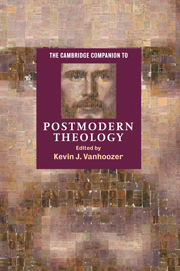9 - Scripture and tradition
from Part 2 - Christian doctrine in postmodern perspective
Published online by Cambridge University Press: 28 May 2006
Summary
One way of telling the story of modernity and postmodernity is by charting the relationship, often volatile and sometimes violent, between Scripture and tradition. At stake is the nature and locus of divine authority: does it reside in the canon or in the community?
In one sense, the postmodern condition would seem to be a swing back to the authority of tradition, in particular, to the authority of interpretative traditions. On the other hand, the postmodern situation brings to light certain reductionistic tendencies in thinking about language and literature. Some look to the later Wittgenstein as indicating a new way of thinking about language. Interestingly, Wittgenstein's emphasis on language use correlated to forms of life brings back the very Scripture/tradition dynamic in a postmodern key. For what is tradition if not a form of life to know and glorify God? And what is Scripture if not a certain use of language to name God?
SCRIPTURE AND TRADITION IN MODERNITY: FROM REFORMATION TO ENLIGHTENMENT
Protestantism: the eclipse of tradition?
From one perspective, the Reformation was a victory of the Scripture principle over ecclesial tradition. The reality, however, is more complex, for the Reformers did not object to the use of the church fathers or deny that the Bible ought to be interpreted in the context of the life of the ongoing church. What they rejected was rather the elevation of noncanonical, and hence human, traditions that were thought to supplement the revelation given in Scripture. The Reformers’ so-called “Scripture principle” identified the Bible as God’s word in human speech, while the notion of the priesthood of all believers handed Scripture to the laity and encouraged them to interpret it for themselves.
- Type
- Chapter
- Information
- The Cambridge Companion to Postmodern Theology , pp. 149 - 169Publisher: Cambridge University PressPrint publication year: 2003
- 12
- Cited by



